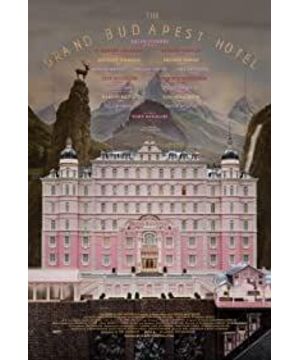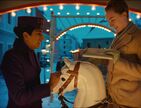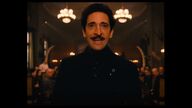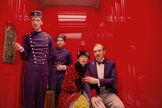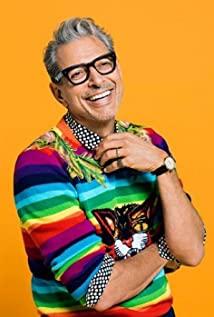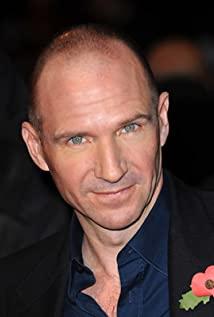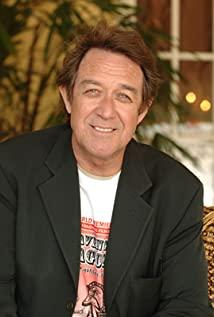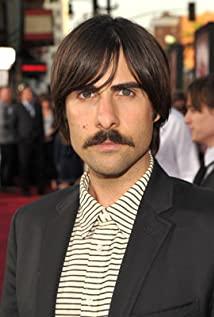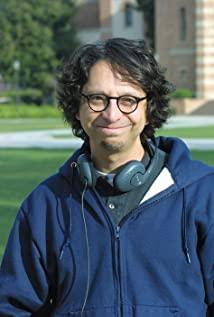At the end of the film, Wes Anderson thanked the Austrian writer Stephen Zweig for his inspiration for the film. We are familiar with Zweig's "Letter from a Strange Woman". He was born rich and he has been writing on the road. The two world wars left the writer in despair as he witnessed the downfall of his "spiritual homeland of Europe", and in 1940 he and his second wife chose to commit suicide in Brazil. Using a flashy hotel to reflect the "spiritual homeland of Europe", using one's fate to reveal that "in the barbaric slaughterhouse, there is still a glimmer of civilization"...
This list of thanks can actually go on. My acting director drafted it as follows: I would like to thank the famous French dessert macaron for bringing the sweet tones of the princess' bedroom to this film, and I would like to thank the Russian nesting dolls for bringing the film a multiple narrative structure like a perspective mirror. The German romantic poet Gustav Swab of "Mythical Stories" gave the male protagonist the name and a poetic heart; thanks to Cervantes and his Don Quixote for bringing the idealism of the male protagonist radiance; thanks to Proust's imaginative little pastry Madeleines for "Time to Go", which provided the Mendel cake brand and the role of Agatha's pastry chef; thanks to Agatha Christie's A series of detective novels, the elf-like heroine is a tribute to her; thanks to good movies that provide some plot inspiration, such as "The Pianist at Sea" provides a professional legend that never gets off the ship, "The Shawshank Redemption" provides a good bridge to escape from prison Duan and Hitchcock's series of films provided the tense rhythm of the murderous evening in the museum, and "Two Smoking Guns" provided a farce of mutual shooting...
"To be honest, I think his world disappeared long before he stepped in, but there is no doubt that he maintained this illusion with his extraordinary charm." The former door boy, now the richest man in the empire, ZERO Evaluate Gustav, his professional and spiritual mentor.
This reminds me of the era of the Republic of China that was revived on the big screen in 2014, "Golden Age", "One Step Away" and "Peace Wheel"... The old era is always nobler and more elegant than the new era, and old money always smells better than new money Less coppery and bloody. This is a chronic disease of the collective unconscious of human beings. We always delete the ugly suffering and unbearable in nostalgia, and the archives are always beautiful and noble.
But if you understand the history of how Europe went from poverty to instant wealth, if you understand that the Grand Budapest Hotel is pure fiction, while the Budapest Castle is real, and is a medieval woman who was bathed in the blood of two young girls at a time. The mansion of the earl, the blood of these maidens is said to maintain her amazing beauty. As the movie said, in the barbaric slaughterhouse, there is still a glimmer of humanity. These things that only grow in the hearts of poets, knights, gentlemen, and hot-blooded teenagers have long been lost in the maker of the barbaric slaughterhouse.
Old Europe is a kind of nostalgia for an outlying island. It is the fire left by Prometheus in ancient Greek mythology. It is the blond, pale, fragile, vain, and hungry old ladies. The big, flashy hotels, they are the churches of Vanity Fair, enshrined in sensual gold, as Gatsby said, the voice of money can be heard in the voice.
I was thinking, if the Duchess is an old aristocrat who has lost his fortune, and if ZERO is not wealthy, what is left of the story? In "The Grand Budapest Hotel", I was illuminated by Gustav's human nature, but more attracted by the sound of money clinking. This new fairy tale of old Europe is still a world of money, two world wars The origin of the world is because of it, and the replacement of the new world is also because of it. Now it has changed its name and is called consumerism. What's wrong with money? What is the crime of consumption? The real sinner, the greedy desire of human nature, snickered behind his back, watching this self-destructive drama play out over and over again.
Wes Anderson will definitely not agree with my misreading of him, he will say that even though I used the money of the old nose to make such a dazzling macaron visual effect, the theme of this film has nothing to do with money , what I want to say is that in my heart, old Europe is to respect the value of each individual, even if he is a ZERO! All the most advanced civilizations are just doing this. Is your country Jiangzi?
In this sense, this new fairy tale about old Europe is just a new macaron vest.
View more about The Grand Budapest Hotel reviews


